The Personal Challenge of Studying Abroad: Learnings and Cross-Cultural Experiences That Lead to a Major Step Up
The Personal Challenge of Studying Abroad: Learnings and Cross-Cultural Experiences That Lead to a Major Step Up
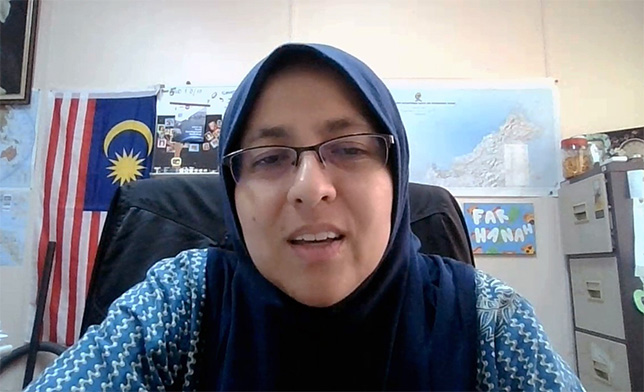
○Noraisyah Binti Mohamed Shah
Nationality: Malaysian
Current country of residence and job type: Malaysia, university lecturer
Awarded in 2000 -> Master’s in Engineering from Oita University in 2001-2003> In 2003, after receiving her master’s degree, she returned to Malaysia to teach at university before studying abroad again -> Received a Ph.D. in the United States in 2014 -> Currently works in the Department of Electrical Engineering, Faculty of Engineering, Universiti Malaya
○Noraisyah Binti Mohamed Shah
Nationality: Malaysian
Current country of residence and job type: Malaysia, university lecturer
Awarded in 2000 -> Master’s in Engineering from Oita University in 2001-2003> In 2003, after receiving her master’s degree, she returned to Malaysia to teach at university before studying abroad again -> Received a Ph.D. in the United States in 2014 -> Currently works in the Department of Electrical Engineering, Faculty of Engineering, Universiti Malaya
Ms. Noraisyah is researching electronics at the Universiti Malaya, Malaysia’s oldest and most prestigious national university. She also works there as a senior lecturer, a position equivalent to an associate professor in Japan. She is a future leader in the Department of Electrical Engineering, one of the most highly regarded fields among Malaysian universities, which have been attracting attention for their global progress in recent years, and she has experience studying in Japan with the support of the Panasonic Scholarship.
Ms. Noraisyah is researching electronics at the Universiti Malaya, Malaysia’s oldest and most prestigious national university. She also works there as a senior lecturer, a position equivalent to an associate professor in Japan. She is a future leader in the Department of Electrical Engineering, one of the most highly regarded fields among Malaysian universities, which have been attracting attention for their global progress in recent years, and she has experience studying in Japan with the support of the Panasonic Scholarship.
Reasonable Preparation, Self-Promotion, and Communication Are the Deciding Factors
Reasonable Preparation, Self-Promotion, and Communication Are the Deciding Factors
“I currently work at Universiti Malaya. In addition to conducting my own research, my main job is to manage and promote the learning activities of undergraduate and graduate students through teaching. After studying the fundamentals of electronics in the undergraduate program at this university, I received a scholarship from Panasonic and went to Japan to deepen my knowledge of artificial intelligence in the master’s program at Oita University. In their computer science department, I conducted research related to image processing. I then returned to Malaysia and remained there as a lecturer for several years before moving to the United States in 2009. In the U.S., I conducted research on satellite communications, which became part of my doctoral thesis. I then earned my Ph.D. in 2014 and returned to Malaysia. Now, I’m here teaching once again.”
Ms. Noraisyah mentioned that during her master’s program in Japan from 2000 to 2003, the term “artificial intelligence” had a slightly different meaning than it does today.
“Machine learning technology has really developed and is very advanced these days. In contrast, at that time, my research was to detect a person’s face and determine the position of their eyes using basic algorithms or analyze image data to make decisions. In other words, it was more mathematical and based on color information. My first year in the Japanese master’s program involved taking classes, and I spent the following year doing research. This experience came in handy when designing the undergraduate and graduate courses I now teach. A new class called ‘Image Processing’ that I established as an elective course for undergraduate students is one example of this, since it incorporates what I learned in Japan.”
Like many other students, Ms. Noraisyah dreamed of studying abroad, and she had researched various scholarships by the time she completed her bachelor’s program.
“Actually, the university had an agreement with Panasonic, and one day, I was called in for an interview along with a few other students. I already had an interest in Japan and had taken a Japanese language program that students who plan to study in Japan attend in preparation. There, I made Japanese friends and was thrilled to experience kimono, kanji, and other parts of the culture. Some of my friends had studied and mastered Japanese, so I naturally thought, ‘Surely, I can do the same.’ Unlike going to an English-speaking country, studying in Japan required learning not just the language but also its writing system, which was not easy for us. But I found myself highly motivated to experience a different culture.”
Using her experience in the Japanese language course, Ms. Noraisyah challenged herself to introduce herself in Japanese at the interview for the Panasonic Scholarship. “I think that pleased the interviewers,” Ms. Noraisyah recalls.
“Generally speaking, figuring out how to express and communicate who you are and what your plans are can be a big help in an interview. I wanted to make a good impression on the interviewers, so I studied basic Japanese and greetings beforehand. I also looked at information on Japanese universities that are strong in my field of study and prepared for questions about which professors I would like to study under and what I would like to study. I think these little bits of effort and preparation worked well in my favor during the selection process.”
“I currently work at Universiti Malaya. In addition to conducting my own research, my main job is to manage and promote the learning activities of undergraduate and graduate students through teaching. After studying the fundamentals of electronics in the undergraduate program at this university, I received a scholarship from Panasonic and went to Japan to deepen my knowledge of artificial intelligence in the master’s program at Oita University. In their computer science department, I conducted research related to image processing. I then returned to Malaysia and remained there as a lecturer for several years before moving to the United States in 2009. In the U.S., I conducted research on satellite communications, which became part of my doctoral thesis. I then earned my Ph.D. in 2014 and returned to Malaysia. Now, I’m here teaching once again.”
Ms. Noraisyah mentioned that during her master’s program in Japan from 2000 to 2003, the term “artificial intelligence” had a slightly different meaning than it does today.
“Machine learning technology has really developed and is very advanced these days. In contrast, at that time, my research was to detect a person’s face and determine the position of their eyes using basic algorithms or analyze image data to make decisions. In other words, it was more mathematical and based on color information. My first year in the Japanese master’s program involved taking classes, and I spent the following year doing research. This experience came in handy when designing the undergraduate and graduate courses I now teach. A new class called ‘Image Processing’ that I established as an elective course for undergraduate students is one example of this, since it incorporates what I learned in Japan.”
Like many other students, Ms. Noraisyah dreamed of studying abroad, and she had researched various scholarships by the time she completed her bachelor’s program.
“Actually, the university had an agreement with Panasonic, and one day, I was called in for an interview along with a few other students. I already had an interest in Japan and had taken a Japanese language program that students who plan to study in Japan attend in preparation. There, I made Japanese friends and was thrilled to experience kimono, kanji, and other parts of the culture. Some of my friends had studied and mastered Japanese, so I naturally thought, ‘Surely, I can do the same.’ Unlike going to an English-speaking country, studying in Japan required learning not just the language but also its writing system, which was not easy for us. But I found myself highly motivated to experience a different culture.”
Using her experience in the Japanese language course, Ms. Noraisyah challenged herself to introduce herself in Japanese at the interview for the Panasonic Scholarship. “I think that pleased the interviewers,” Ms. Noraisyah recalls.
“Generally speaking, figuring out how to express and communicate who you are and what your plans are can be a big help in an interview. I wanted to make a good impression on the interviewers, so I studied basic Japanese and greetings beforehand. I also looked at information on Japanese universities that are strong in my field of study and prepared for questions about which professors I would like to study under and what I would like to study. I think these little bits of effort and preparation worked well in my favor during the selection process.”
The Experience of Bouncing Back with the Support of the Scholarship
The Experience of Bouncing Back with the Support of the Scholarship
Ms. Noraisyah had always been a high academic achiever and an effective communicator, but soon after arriving in Japan as a Panasonic scholarship student, she had an unexpected encounter.
“The truth is that I had originally planned to go on to Osaka University, but I didn’t prepare in time and failed the entrance exam. It was a huge shock for me, as I had always been an honor student. It was very difficult for me to face and accept such a situation, especially in a foreign country where I was so clueless that I didn’t know left from right.”
Understandably, this bolt from the blue after receiving the scholarship left her at a loss. But Ms. Noraisyah says that the Panasonic Scholarship was there to support her.
“Everyone was very kind, calling me and saying, ‘Let’s meet to talk about it,’ and giving me guidance on how to find other universities. They gave me a lot of support, both practically and emotionally, and because of that, I was able to bounce back. Eventually, I regained my self-confidence and decided to apply to Oita University. Fortunately, I had some time before the entrance exam for Oita University, so I moved to Oita Prefecture, prepared for a few months, and finally got accepted. When I failed the first exam and met with the scholarship staff, I felt bad for letting everyone down. But they were very understanding of my situation and feelings, took me out for meals, and shared stories from their student days when they had similar experiences. This made me realize that ‘what happened to me was unfortunate but not insurmountable.’”
Ms. Noraisyah had always been a high academic achiever and an effective communicator, but soon after arriving in Japan as a Panasonic scholarship student, she had an unexpected encounter.
“The truth is that I had originally planned to go on to Osaka University, but I didn’t prepare in time and failed the entrance exam. It was a huge shock for me, as I had always been an honor student. It was very difficult for me to face and accept such a situation, especially in a foreign country where I was so clueless that I didn’t know left from right.”
Understandably, this bolt from the blue after receiving the scholarship left her at a loss. But Ms. Noraisyah says that the Panasonic Scholarship was there to support her.
“Everyone was very kind, calling me and saying, ‘Let’s meet to talk about it,’ and giving me guidance on how to find other universities. They gave me a lot of support, both practically and emotionally, and because of that, I was able to bounce back. Eventually, I regained my self-confidence and decided to apply to Oita University. Fortunately, I had some time before the entrance exam for Oita University, so I moved to Oita Prefecture, prepared for a few months, and finally got accepted. When I failed the first exam and met with the scholarship staff, I felt bad for letting everyone down. But they were very understanding of my situation and feelings, took me out for meals, and shared stories from their student days when they had similar experiences. This made me realize that ‘what happened to me was unfortunate but not insurmountable.’”
The Friends and the Scholarship That Were There for Me and Supported Me Like Family
The Friends and the Scholarship That Were There for Me and Supported Me Like Family
“The Panasonic Scholarship not only provided financial support but also organized events and activities during my study abroad period, which helped me emotionally,” says Ms. Noraisyah.
“We had regular meetings in Osaka, and during the summer break, tours were organized where we visited various places and stayed at traditional Japanese inns. There were many study-abroad students not only from Malaysia but also from other countries like Indonesia, South Korea, Thailand, and Vietnam. Whenever there was a gathering, we would hold cultural shows to introduce each other’s cultures. So, I had many opportunities to learn about countries other than Japan, which was always eye-opening. These activities gave us a sense of being a small family, facing the hardships and stresses of living in a foreign country together.
At that time, the technologies we have today, like social networking and video calls, weren’t available, and the best we could do was to keep in touch through phone calls, email, and text messages. If a problem arose, meeting and talking in person was the norm, and that was very helpful for us as international students who often felt lonely. This experience in Japan has helped me to understand what kind of support is needed for foreign students coming to Malaysia to study abroad in my current capacity as a teacher.”
When asked what she found to be particularly impressive about Japanese culture, she responded,
“Japan has the Doll Festival, right? There were all these beautiful dolls and decorations. I really liked that. I found it very touching to know that in Japan, there is a culture of celebrating children’s health and growth, and one that is specially for girls too!”
“The Panasonic Scholarship not only provided financial support but also organized events and activities during my study abroad period, which helped me emotionally,” says Ms. Noraisyah.
“We had regular meetings in Osaka, and during the summer break, tours were organized where we visited various places and stayed at traditional Japanese inns. There were many study-abroad students not only from Malaysia but also from other countries like Indonesia, South Korea, Thailand, and Vietnam. Whenever there was a gathering, we would hold cultural shows to introduce each other’s cultures. So, I had many opportunities to learn about countries other than Japan, which was always eye-opening. These activities gave us a sense of being a small family, facing the hardships and stresses of living in a foreign country together.
At that time, the technologies we have today, like social networking and video calls, weren’t available, and the best we could do was to keep in touch through phone calls, email, and text messages. If a problem arose, meeting and talking in person was the norm, and that was very helpful for us as international students who often felt lonely. This experience in Japan has helped me to understand what kind of support is needed for foreign students coming to Malaysia to study abroad in my current capacity as a teacher.”
When asked what she found to be particularly impressive about Japanese culture, she responded,
“Japan has the Doll Festival, right? There were all these beautiful dolls and decorations. I really liked that. I found it very touching to know that in Japan, there is a culture of celebrating children’s health and growth, and one that is specially for girls too!”
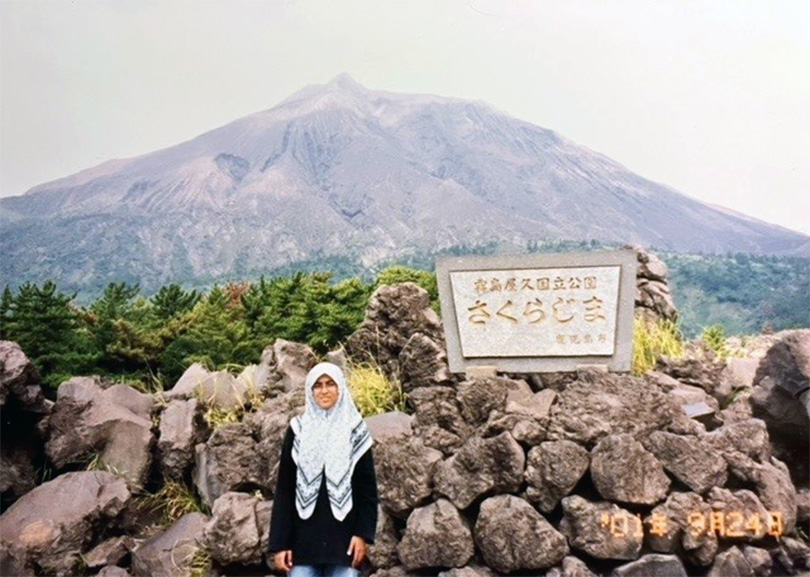
While studying in Japan, I saw all kinds of Japanese culture and sights. This photo shows Sakurajima, which I toured in 2001 while visiting a friend who attends Kagoshima University.
While studying in Japan, I saw all kinds of Japanese culture and sights. This photo shows Sakurajima, which I toured in 2001 while visiting a friend who attends Kagoshima University.
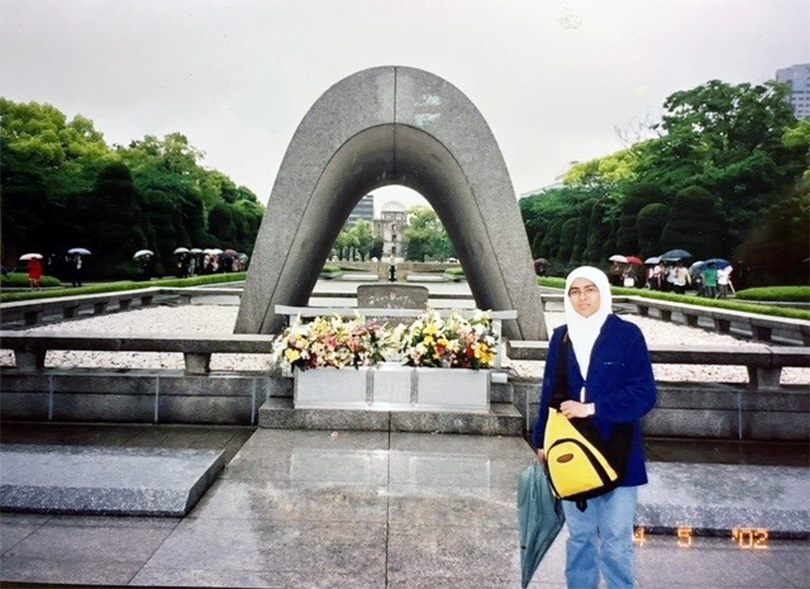
In 2002, I visited Hiroshima Peace Memorial Park and toured several memorials organized by Panasonic Scholarship. I remembered that I was really touched by the suffering caused by the atomic bomb. I recalled that I was among the last to come out of the memorial because I was reading every entry I could find in the museum, and everyone was waiting for me!
In 2002, I visited Hiroshima Peace Memorial Park and toured several memorials organized by Panasonic Scholarship. I remembered that I was really touched by the suffering caused by the atomic bomb. I recalled that I was among the last to come out of the memorial because I was reading every entry I could find in the museum, and everyone was waiting for me!
Learning with a Global Perspective and Collaborating with Industry to Support National Development
Learning with a Global Perspective and Collaborating with Industry to Support National Development
In terms of research, in addition to learning the fundamentals of a field of study of which she is constantly deepening her knowledge, Ms. Noraisyah says it was also important for her to learn methods for conducting and advancing research.
“At the Japanese university, we had weekly group meetings where everyone would present their research progress. This helped us learn about each other’s challenges and approaches. I found it to be very beneficial. So, now, I employ the same method when I teach my students. I share how I and others have advanced our research in the past week while providing basic information as an instructor to help students deepen their understanding. I also learned these methodologies from a professor at Oita University.”
Ms. Noraisyah truly enjoys teaching at the university and hopes to continue “designing” courses that engage students and help them learn better.
“At the same time, I’m currently researching satellite communications and machine learning, so I’d like to reach out to companies that provide satellite communications services in Malaysia and foster more collaboration between the industry and the university. If we can get companies to provide various data and research problems that students can solve, and if that collaboration works well, I believe that both research and industry can be further developed. I hope we can turn this movement into something much bigger.”
Language barriers as well as differences in lifestyle and culture are just some of the many ways in which the experience of studying abroad has challenged Ms. Noraisyah outside of her academic pursuits. However, despite the many difficulties she faced, she overcame them all with the help of the Panasonic Scholarship and those around her.
“When I first came to Japan, I remember often getting lost and feeling a little scared. But whenever I was really in trouble, the police helped me. Sometimes, they even gave me a ride to my destination when I asked for directions. I also met families who supported international students and were always there whenever I had problems—helping with everything from daily meals to furnishing my apartment when I moved.
If any of you are considering studying abroad, I urge you to be courageous and bold enough to take on new challenges. You should learn the language of the country, and then visit other countries from there. Especially in the field of electronics, you need to know technical terms in the local language. That’s why studying in a foreign country is a great challenge. But that’s why the rewards you gain from overcoming this challenge are so great. Even after graduation, I recommend studying abroad to students interested in graduate research. By going to a foreign country, broadening your perspective, and seeing other countries and cultures, you can grow not only technically and professionally but also as a person.”
In terms of research, in addition to learning the fundamentals of a field of study of which she is constantly deepening her knowledge, Ms. Noraisyah says it was also important for her to learn methods for conducting and advancing research.
“At the Japanese university, we had weekly group meetings where everyone would present their research progress. This helped us learn about each other’s challenges and approaches. I found it to be very beneficial. So, now, I employ the same method when I teach my students. I share how I and others have advanced our research in the past week while providing basic information as an instructor to help students deepen their understanding. I also learned these methodologies from a professor at Oita University.”
Ms. Noraisyah truly enjoys teaching at the university and hopes to continue “designing” courses that engage students and help them learn better.
“At the same time, I’m currently researching satellite communications and machine learning, so I’d like to reach out to companies that provide satellite communications services in Malaysia and foster more collaboration between the industry and the university. If we can get companies to provide various data and research problems that students can solve, and if that collaboration works well, I believe that both research and industry can be further developed. I hope we can turn this movement into something much bigger.”
Language barriers as well as differences in lifestyle and culture are just some of the many ways in which the experience of studying abroad has challenged Ms. Noraisyah outside of her academic pursuits. However, despite the many difficulties she faced, she overcame them all with the help of the Panasonic Scholarship and those around her.
“When I first came to Japan, I remember often getting lost and feeling a little scared. But whenever I was really in trouble, the police helped me. Sometimes, they even gave me a ride to my destination when I asked for directions. I also met families who supported international students and were always there whenever I had problems—helping with everything from daily meals to furnishing my apartment when I moved.
If any of you are considering studying abroad, I urge you to be courageous and bold enough to take on new challenges. You should learn the language of the country, and then visit other countries from there. Especially in the field of electronics, you need to know technical terms in the local language. That’s why studying in a foreign country is a great challenge. But that’s why the rewards you gain from overcoming this challenge are so great. Even after graduation, I recommend studying abroad to students interested in graduate research. By going to a foreign country, broadening your perspective, and seeing other countries and cultures, you can grow not only technically and professionally but also as a person.”
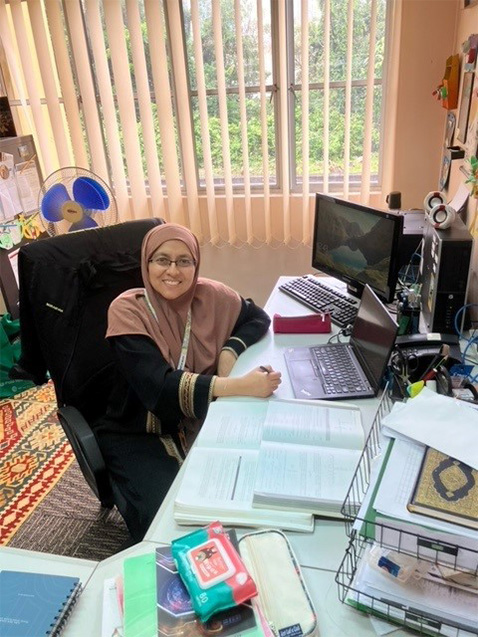
Ms. Noraisyah’s current workplace and laboratory
Ms. Noraisyah’s current workplace and laboratory
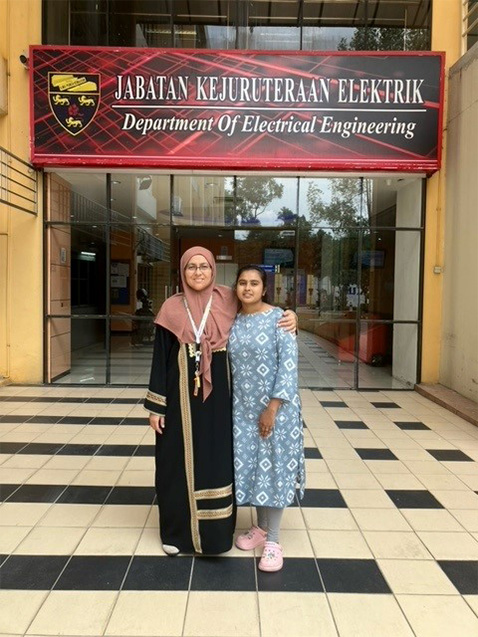
A photo of Ms. Noraisyah with a short-term student from India
A photo of Ms. Noraisyah with a short-term student from India


